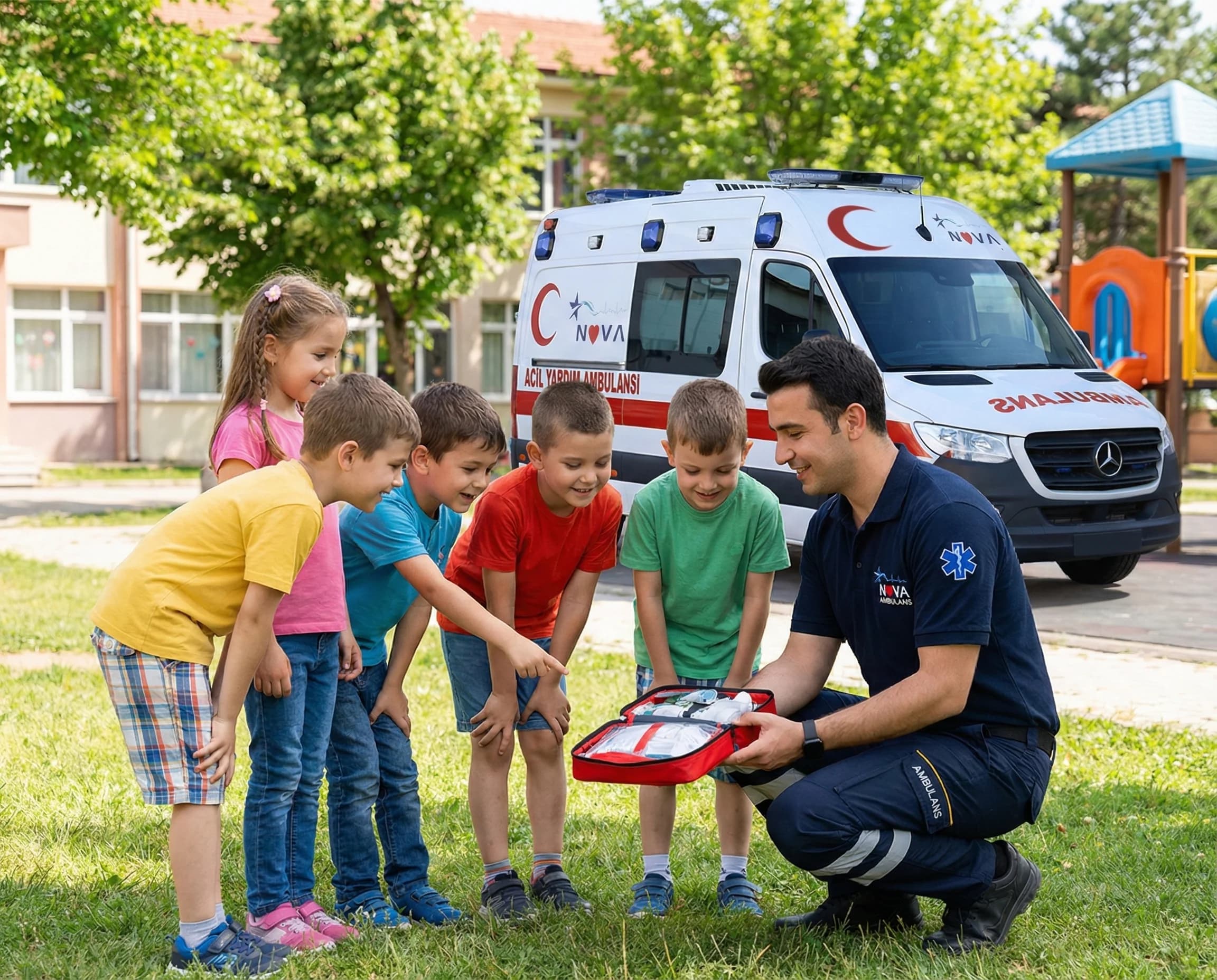Okula Dönüş 2025: Çocuklar İçin Acil Durum ve İlk Yardım Rehberi
Okul servisinden spor salonuna: Olası kazalarda doğru adımlar, ebeveyn iletişim planı ve ne zaman 112/Nova Ambulans'ı aramanız gerektiği.
💡Key Takeaways
- Servis Güvenliği: Emniyet kemeri kontrolü ve acil durum bilgi kartı hazırlayın.
- Kronik Durumlar: Alerji ve astım planlarını okulla paylaşın.
- Spor Sakatlıkları: Burkulmalarda RICE protokolünü uygulayın.
- Kırmızı Bayraklar: Nefes darlığı veya bilinç kaybında hemen ambulans çağırın.

Eylül, okula dönüşle birlikte hareketliliğin arttığı bir dönemdir. Servis, bahçe, spor salonu ve kulüpler; küçük kazaların daha sık görülebileceği yerlerdir. Bu rehber, 2025–2026 yılı için pratik öneriler sunar.
Okula Dönüş 2025: Acil Durum ve İlk Yardım Rehberi
1) Okul ve Servis Güvenliği Kontrol Listesi
- Servis aracında emniyet kemerleri çalışıyor mu, çocuk doğru koltukta ve kemeri uygun yükseklikte mi?
- Çocuğun okul çantasında isimli bir kart var mı? Kartta şu bilgiler bulunmalı:
- Ebeveyn/vasî ad-soyad ve telefon
- Hekim bilgisi (varsa)
- Bilinen alerjiler (ilaç, gıda, arı vb.)
- Kronik hastalıklar (astım, epilepsi, diyabet…)
- Okulda sağlık personeli/rehberlik birimi ile acil durumda nasıl iletişim kurulacağı net mi?
- Aile içi acil durum planı hazır mı? (Kimin kimi arayacağı, yedek ulaşılacak kişi, ev-iş mesafesi ve tahmini varış süreleri)
2) Alerji, Astım ve Kronik Durum Yönetimi
- Çocuğunuzun düzenli ilaçları için imzalı izin formu ve hekim raporu okulda mevcut olmalı.
- Astım hastaları için yedek inhaler, hazne aparatı ve kullanım talimatı öğretmende/emniyetli bir dolapta bulunmalı.
- Şiddetli alerji riski olan çocuklarda (anafilaksi öyküsü), adrenalin oto-enjektörünün nerede olduğu ve nasıl kullanılacağı en az iki personel tarafından bilinmeli.
3) Spor ve Oyun Kaynaklı Sakatlıklar: İlk Adımlar
- Bilek burkulması veya diz dönmesi şüphesinde spor hekimlerinin önerdiği RICE protokolü: Rest (dinlenme), Ice (soğuk uygulama), Compression (kompresyon bandaj), Elevation (yükseltme).
- Açık yara/kesilerde temiz suyla nazikçe temizleyin, kanama varsa temiz bir gazlı bezle basınç uygulayın.
- Kafa travmasında (baş dönmesi, kusma, uykuya meyil) spora dönüşü durdurun ve mutlaka tıbbi değerlendirme isteyin.
4) Ne Zaman 112 veya Ambulans Çağırmalı?
Aşağıdaki “kırmızı bayrak” belirtiler ciddi bir duruma işaret edebilir:
- Nefes darlığı, hırıltı, morarma, konuşmakta güçlük
- Bilinç bulanıklığı, tekrarlayan kusma, nöbet
- Şiddetli alerjik reaksiyon (dil-dudak-gırtlak şişmesi, yaygın kurdeşen)
- Kontrol edilemeyen kanama veya ciddi şekil bozukluğu (kırık şüphesi)
- Şiddetli karın ağrısı, eşlik eden ateş ve halsizlik
Bu durumlarda 112 veya Nova Ambulans aranmalıdır. Nova Ambulans, özel acil servis statüsünde olduğu için hastanızı dilediğiniz özel hastaneye nakledebilir. 112 ise genellikle en yakın kamu hastanesine nakil sağlar.
Not: Özel hastanelerin kapasite veya donanım yetersizliği nedeniyle hasta kabul etmeme durumu olabilir. Bu durumda Nova Ambulans, hastanız için en uygun alternatif özel hastaneyi bulur veya hastanın güvenliği için en yakın kamu hastanesine naklini sağlar.
5) Mini Acil Çanta: Okul Çantasına Sığar
- Farklı boylarda yara bandı ve küçük steril gazlı bez
- Flaster (tıbbi bant), küçük makas ve tek kullanımlık eldiven
- Antiseptik mendil, anında soğuk kompres paketi
- (Varsa) kişisel ilaçlar ve kullanım talimatı
6) İletişim ve Bilgilendirme
- Öğretmen ve idareyle düzenli iletişim; zorbalık, anksiyete ve psikosomatik belirtilere dikkat.
- Çocuğunuza basit ilk yardım adımlarını öğretin: Kanamada basınç, burnu kanadığında öne eğilip burun kanatlarına hafif baskı uygulamak gibi.
Hazırlıklı olmak, paniği azaltır ve doğru karar vermenizi sağlar. Güvende ve sağlıklı bir dönem dileriz.
Tıbbi acil durum şüphesinde 112'yi veya Nova Ambulans'ı arayabilirsiniz. Nova Ambulans, özellikle özel hastane tercihi olan aileler için esnek bir alternatif sunar. Soru ve planlama talepleriniz için ekibimiz yanınızdadır.
Sıkça Sorulan Sorular
Okulda alerjisi olan çocuğum için hangi bilgileri mutlaka iletmeliyim?
Çocuğunuzun alerjenlerini, daha önce geçirdiği reaksiyonları ve kullandığı ilaçları yazılı olarak okula vermeniz önemlidir. Adrenalin oto-enjektörü varsa nerede saklanacağını ve kimlerin kullanmayı bildiğini netleştirmelisiniz.
Çocuğum okulda başını çarparsa her zaman acile gitmeli miyim?
Kısa süreli hafif çarpma ve şikâyetsizlik durumunda gözlem yeterli olabilir. Ancak kusma, şiddetli baş ağrısı, dengesizlik, konuşma bozulması veya uykuya meyil varsa acil servise başvurulmalı ve gerekirse ambulans çağrılmalıdır.
Okul çantasında mini acil çanta bulundurmak zorunlu mu?
Yasal zorunluluk olmasa da küçük bir ilk yardım çantası, küçük kesik ve çarpmalarda hızlı müdahaleyi kolaylaştırır. İçindeki malzemelerin öğretmen ve okul yönetimiyle uyumlu şekilde kullanılmasını sağlamak için listeyi onlarla paylaşmak iyi bir fikirdir.
İlgili Blog Yazıları
- Acil Durum Çantası: Evde ve Arabada Neler Bulunmalı? — Okul çantasına eklenecek mini ilk yardım setinin içeriği ve hazırlık önerileri.
- Nobet ve Havalede Ambulans Ne Zaman Çağrılmalı? — Çocuklarda kriz durumunda acil müdahale rehberi.
- Ambulans Beklerken: Hasta Yakınları İçin Rehber — Okulda ani acil durumda ambulans gelene kadar yapılması gerekenler.
Kaynaklar
- T.C. Millî Eğitim Bakanlığı — Okul sağlığı ve güvenlik protokolleri ile ilk yardım eğitimi rehberleri.
- T.C. Sağlık Bakanlığı Halk Sağlığı Genel Müdürlüğü — Çocuk sağlığı, aşı ve okul dönemi sağlık hazırlığı bilgilendirmeleri.
İlginizi Çekebilir: Acil Durum Çantası: Evde ve Arabada Neler Bulunmalı?